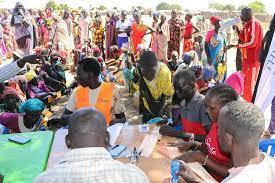
Nairobi, Kenya, 6 June, 2024 – South Sudan is facing a confluence of humanitarian crises that are pushing the country to the brink of starvation. Conflict in neighboring Sudan has caused over 692,000 people to flee into the country, hyperinflation is crippling the economy, climate change impacts continue to wreak havoc and all the while, the humanitarian Aid fund is only at 16%.
The humanitarian situation in South Sudan is getting worse every day.
Abel Whande, CARE in South Sudan Country Director.
At the same time, forecasts indicate that there will be above-normal rainfall in July following heavy rains that have affected several areas in East Africa earlier this year. Already, 46% of South Sudan’s, 5.83 million people, were facing a worsening hunger situation with reports indicating that 1.7 million children could face malnutrition in 2024. All these factors combined are placing millions of lives and livelihoods at immediate risk.
Hunger, disease, lack of safe drinking water, and health care stalk these people seeking safety and protection. They need help.
Abel Whande, CARE in South Sudan Country Director.
“The humanitarian situation in South Sudan is getting worse every day,” said Abel Whande, CARE in South Sudan Country Director. “We are particularly concerned at the condition of women, girls, and children arriving at transit centers in Rienk and Bahr el Ghazal, as part of the dramatic increase in refugees escaping violence in Sudan. Many have trekked for days in extreme temperatures and when they arrive, there’s little food for them, forcing new arrivals to depend on the generosity of host communities who are themselves struggling. Hunger, disease, lack of safe drinking water, and health care stalk these people seeking safety and protection. They need help.”
We often had nothing to eat, sleeping most nights on an empty stomach
Nadia, a Sudanese refugee.
Nadia, a Sudanese refugee, used to sell tea at the market in Khartoum. After the conflict broke out, she fled with her husband and three children to save themselves. “It took us three months to reach Renk, relying on the kindness of strangers who occasionally gave us car rides. Along the way, we witnessed children succumbing to illnesses they contracted during the journey. We often had nothing to eat, sleeping most nights on an empty stomach,” Nadia said.
Aid agencies in South Sudan have been forced to cut vital services like food, healthcare, and sanitation for the most vulnerable as funding has dwindled. This reduction in aid comes amid severe needs, risking widespread hunger and disease. Hyperinflation and currency depreciation have made access to basic necessities nearly impossible, with families spending most of their income on food. This economic crisis, combined with the aftermath of years of conflict, severely undermines the communities' ability to rebuild and recover. Adding to the difficulties, South Sudan is also bearing the brunt of the extreme impacts of climate change. Extreme weather events, including floods and prolonged droughts, are destroying crops, displacing communities, and exacerbating food insecurity. These climate shocks are pushing already vulnerable people into deeper poverty and despair. CARE alongside South Sudan local organizations are working hard to support communities and the refugees and returnees however they can but the situation is overwhelming. "The influx of refugees and returnees while communities already are facing severe conditions worsen an already bad humanitarian situation, " said Angelina Nyajima, CEO of Hope Restoration, one of CARE’s partners. Angelina Nyajima, CEO of Hope Restoration, one of CARE’s partners. "People are already living on reduced food rations, high malnutrition, and a lack of adequate health care. The impending floods will worsen Unity State's already high water levels, potentially causing catastrophic consequences. From gender-based violence to minimal access to healthcare and education, women and girls are suffering the most daily. Urgent action is needed to address their needs. We must not turn a blind eye to their situation We urgently call on the international community to provide resources to prepare for the impact of climate change in South Sudan." To avert a catastrophe, the international community must act swiftly. Increased funding for the humanitarian response is paramount. More specifically, support must extend to the host communities, the ones who generously share their limited resources with displaced families. And long-term solutions, like investments in infrastructure, agriculture, and education, are the only way to break the cycle of poverty and vulnerability that fuels conflict. Angelina Nyajima, CEO of Hope Restoration, one of CARE’s partners. Finally, addressing the root causes of this conflict is essential to prevent further displacement and instability, bringing lasting peace to the region. Only through a multi-pronged approach can we ensure a brighter future for South Sudan. For media inquiries, please contact David Mutua, CARE East Central, & Southern Africa Regional Communications Advisor, via: david.mutua@care.org.
The influx of refugees and returnees while communities already are facing severe conditions worsens an already bad humanitarian situation.
From gender-based violence to minimal access to healthcare and education, women and girls are suffering the most daily.
Note to Editors











